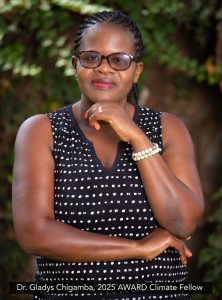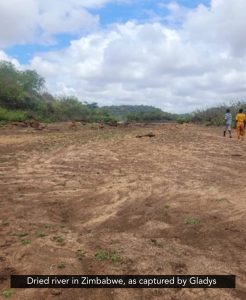
Gladys Chigamba, a research scientist and adjunct lecturer focusing on fisheries, describes herself as a ‘pure inbred’ having earned three degrees from the same institution, Lilongwe University of Agriculture and Natural Resources (LUANAR). Surprisingly, the choice to study fisheries was not her first one. She found herself on the fisheries list and struggled to change but was convinced by her father to take it. He urged her to take up the course, reminding her that they survived on fish growing up, as they lived near a dam in a village in Zimbabwe where her mother hails and her Malawian father worked until retirement. “It is science. Science is for the bold,” her father asserted. His conviction was enough to get her to enroll and specialize in fisheries in her second year, where in a class of 20, she was one of only two girls.
Today, Gladys is proud to have chosen studies that resonate with her ancestral roots in Zimbabwe where the aquatic ecosystem was part of her upbringing. “I can fish, I used to fish with my uncle,” says Gladys indicating where her interest in maintaining aquatic natural resources stems from. Sadly, the dam that provided the fish in her childhood diet is almost dry. She describes visiting her childhood village in December 2004 and observing the impacts of climate change.
“Where we used to go on a boat, I can now walk,” describing the change in rivers that are now seasonal. As part of her community work, Gladys is contributing to efforts to restore the dam. “The ancestors want me there. I grew up in the village, we had almost everything; water, fish, irrigation systems and when the river flooded, we could pick fish from the fields,” she reminisces.
Serving as her department’s gender focal point, Gladys is working with women in watershed management and encouraging them to adopt climate smart methods for processing fish such as frying, parboiling, sun drying using solar dryers that are available in most beaches and completing the process of smoking using electric kilns. Through her work, Gladys is encouraging women to embrace diverse income generating projects, as they are sometimes vulnerable to climate conditions.
“Our lake can sometimes be very hostile, so the women are unable to buy and sell fish,” she explains. These vulnerabilities at times force women to exchange sex for fish. Gladys is also working with women smallholder farmers through the village savings and loans to enhance their capacity to adapt to climate change. “Farmers suffer as they don’t have what it takes to be resilient,” observes Gladys adding that banks do not view fish farming as a source of income that can service loans. She also advocates for the farmers to gain loan assistance from banks.

Through the Accelerating Women’s Leadership in Climate Action Fellowship, Gladys is keen to further her work in climate change. Drawn to her aquatic roots, she wants to tackle aquatic ecosystems—to equip fish farmers to practice water efficient farming and watershed management. Gladys also wants to encourage farmers to embrace other income generating activities to cushion them during the period when the lake is closed for fishing. This short period is aimed at tackling overfishing, but farmers will attempt to fish illegally when they don’t have alternatives.
Gladys, one of the inaugural AWARD Climate Fellows, is already seeing the benefits of the Fellowship. The mentorship and leadership skills training they have received has given her direction on how to grow as a professional. “The training was really informative and transformative for me,” she asserts. Gladys is already using the knowledge gained in her work, communicating effectively with her seniors, addressing one of her challenges of influencing upwards, especially in a male-dominated field, citing negative body language as some of the ways women face resistance in such spaces. Through AWARD, she has expanded her network, which connected her to her mentor and other AWARD Fellows who she collaborates with and uses as a sounding board. Gladys is confident that the fellowship will enhance her visibility beyond the communities she works with. “I am visible at local level, working with the community and the reason for this fellowship is for us to be visible on the global scene,” she concludes.
Gladys Chigamba, a researcher at the Lilongwe University of Agriculture and Natural Resources (LUANAR) in Malawi, is one of a growing number of Fellows in the CLARE-funded Fellowship on accelerating African women’s leadership in climate action. Climate Adaptation and Resilience (CLARE) is a flagship research programme on climate adaptation and resilience, funded mostly (about 90%) by UK Aid through the Foreign Commonwealth and Development Office (FCDO), and co-funded by the International Development Research Centre (IDRC), Canada. CLARE is bridging critical gaps between science and action by championing Southern leadership to enable socially inclusive and sustainable action to build resilience to climate change and natural hazards. The views expressed herein do not necessarily represent those of the UK government, IDRC or its Board of Governors. Learn more about CLARE
